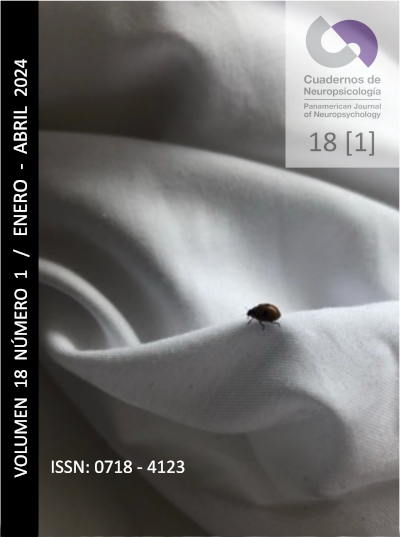Neuropsychological assessment in severe obesity: comparison between obesity class
Abstract
ABSTRACT
Neuropsychology has been studying the effects of obesity on cognition and its relationship with dementia and factors that may be related to the difficulty of losing weight. Objective: Neuropsychological assessment of cognitive functions in patients with severe obesity. Method: 99 patients were selected from the outpatient clinic of the Bariatric and Metabolic Surgery Unit of the Hospital das Clínicas, Faculdade de Medicina da USP, between 2018 and 2020. The patients were divided according to the class of obesity in G1 (40.0 < BMI < 49.9 Kg/m2; n=56) and G2 (BMI ≥ 50 Kg/m2; N=43). Results: Patients showed mild cognitive deficits in executive functions, short- and long-term verbal memory, and retrieval of recall memory. There was no significant difference in cognitive functions related to obesity class (G1 vs. G2). Conclusions: Severely obese patients showed mild cognitive impairment compared to the general population in short- and long-term verbal memory and executive functions unrelated to obesity class.
Keywords: attention; cognitive functions; memory; obesity class severe obese.
RESUMEN
La neuropsicología viene estudiando los efectos de la obesidad sobre la cognición y su relación con la demencia y los factores que pueden estar relacionados con la dificultad para perder peso. Objetivo: Evaluación neuropsicológica de las funciones cognitivas en pacientes con obesidad severa. Método: 99 pacientes fueron seleccionados del ambulatorio de la Unidad de Cirugía Bariátrica y Metabólica del Hospital das Clínicas, Faculdade de Medicina da USP, entre 2018 y 2020. Los pacientes fueron divididos según la clase de obesidad en G1 (40,0 < IMC < 49,9 Kg/m2; n=56) y G2 (IMC ≥ 50 Kg/m2; N=43). Resultados: Los pacientes mostraron déficits cognitivos leves en las funciones ejecutivas, la memoria verbal a corto y largo plazo y la recuperación de la memoria. No hubo diferencia significativa en las funciones cognitivas relacionadas con la clase de obesidad (G1 vs. G2). Conclusiones: Los pacientes con obesidad severa mostraron deterioro cognitivo leve en comparación con la población general en memoria verbal a corto y largo plazo y funciones ejecutivas no relacionadas con la clase de obesidad.
Palabras clave: atención; funciones cognitivas; memoria; clase de obesidad obesidad severa, estudio tramversal.
RESUMO
A neuropsicologia vem estudando os efeitos da obesidade sobre a cognição e sua relação com a demência, além dos fatores que podem estar associados à dificuldade de perda de peso. Objetivo: Avaliação neuropsicológica das funções cognitivas em pacientes com obesidade severa. Método: 99 pacientes foram selecionados do ambulatório da Unidade de Cirurgia Bariátrica e Metabólica do Hospital das Clínicas da Faculdade de Medicina da USP, entre 2018 e 2020. Os pacientes foram divididos de acordo com a classe de obesidade em G1 (40,0 < IMC < 49,9 Kg/m²; n=56) e G2 (IMC ≥ 50 Kg/m²; n=43). Resultados: Os pacientes apresentaram déficits cognitivos leves nas funções executivas, memória verbal de curto e longo prazo, e recuperação de memória. Não houve diferença significativa nas funções cognitivas em relação à classe de obesidade (G1 vs. G2). Conclusões: Pacientes com obesidade severa demonstraram leve comprometimento cognitivo em comparação com a população geral, em memória verbal de curto e longo prazo e funções executivas, não relacionadas à classe de obesidade.
Palavras-chave: atenção; funções cognitivas; memória; classe de obesidade; obesidade severa.Downloads
How to Cite
Issue
Section
License
Articles published in this journal are protected under the Creative Commons Attribution-NonCommercial-ShareAlike 4.0 International (CC BY-NC-SA 4.0) license. This means that authors retain full rights over their research and publications at all times. As a journal, we fully respect and promote the principles of open access established by this license, allowing the work to be shared, adapted, and distributed for non-commercial purposes, provided that appropriate credit is given to the authors and any derivative works are licensed under the same terms.
Authors are responsible for obtaining the required permission when they wish to reproduce part of the material (figures, etc.) from other publications.
Likewise, CNPs allows authors to host in their personal sites or other repositories that they deem convenient the Final and Definitive Version of the published article with the format assigned by the journal. In no case do we allow access to preprints of the article under evaluation or already published.
When submitting an article to CNPs you are aware that all the contents of CNPs are under a Creative Commons License. In which it is allowed to copy and share the contents freely, always making reference to the origin of the publication and its author.












